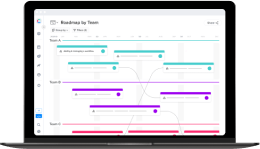Home > Blog > Strategy + OKRS Part 1: The golden ingredients in your product roadmap
Strategy + OKRS Part 1: The golden ingredients in your product roadmap

Product roadmaps are the directional tools PMs use to gain traction, maintain momentum, and build enthusiasm for the impact new features can generate. They are the results of the work put into strategy and discovery and provide the playing field where you can huddle with the team, facilitate discussion and align over which moves you should take next to fuel your company’s long term success. However, for product roadmaps to function effectively, drive innovation and cohesion, they must connect to a company’s mission, strategy, and OKRs. In this two-part exploration, we cover why the connection between product roadmaps and top-level strategic concepts is critical to building great products.
On a practical level, a roadmap allows you to map the path of feature creation: building blocks, milestones, and workflows are plotted together to give you a clear visualization of how the product is to evolve. But if roadmap creation happens in a vacuum, that is to say, if it isn’t tethered to a guiding vision/mission or strategy, it can quickly sway away from overall business goals and end up serving as a dressed-up backlog. This can lead to misalignment across the organization, fragmented development, and ultimately makes it increasingly difficult, if not impossible, to deliver on the company’s objectives. Perhaps that sounds a little dramatic, so let us explain.
As product managers, we know our work is continuously informed by context. Information about how previously deployed features have performed, the current competitive landscape, ever-changing user needs, and our company’s available resources and capabilities all influence each new decision we make. Add to that the fact that product development is not linear, but an iterative process, and it’s crystal clear that to create impactful products, decisions made need to be buoyed by the past and looking to the future.
This is why a product roadmap can’t simply stand alone without being supported by a substantive strategy, which provides it with the context from which informed, validated, and valuable work can be conceived. Think of planning a road trip. You could dive straight into planning and throw darts on a map, select stops, and make reservations, but without first understanding what you want to get out of the trip, what your priorities are, and what your final destination will be, your plan will likely be haphazard, disorganized and leave you dissatisfied. Such is the relationship between strategy and roadmap: you must have a well-articulated mission and strategy in order to conceive a similarly well-informed and nuanced roadmap, and the link between the two must be tangible throughout the product creation process.
Output vs. Outcome
Understanding this, it’s clear then why a product roadmap can not merely be an output-focused tool (i.e., a list of features being built) articulating what you’re planning to develop – instead, an effective roadmap is outcome-focused, guides your choices, and improves clarity as to why you’re focusing on specific features.
The product roadmap provides everyone involved in the process the space to check-in, reflect, and answer these important questions:
- Does the feature answer a user need we have prioritized as a company?
- Is the release aligned with our quarterly/yearly goals and timeline?
- Are we correlating milestones to specific strategic objectives?
Answering these questions on a regular basis ensures you are constantly qualifying roadmap decisions and ensuring involved stakeholders can properly refine, evaluate, and define the best possible product choices.
Ready to find out how all these elements fit together? Check out Strategy + OKRS Part 2: Building blocks for a solid product roadmap to dive deeper into which strategic elements must be mastered and linked to your product roadmap in order to drive smarter product decisions.
Ready to connect your strategy and OKRs directly to product roadmaps? Sign up to a free 14-day trial with craft.io and discover how a tool created exclusively for PMs can increase transparency and efficiency in your organization.

